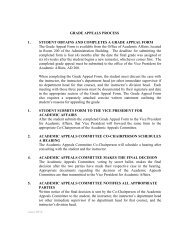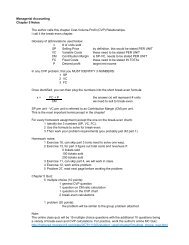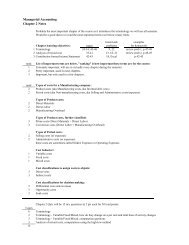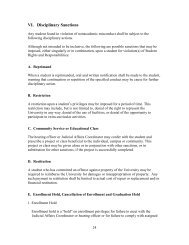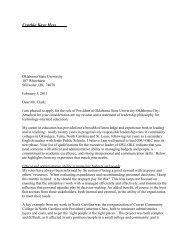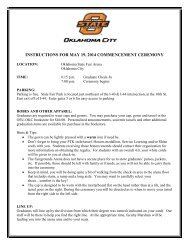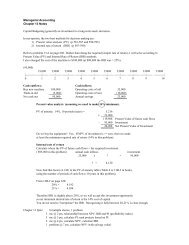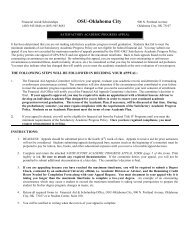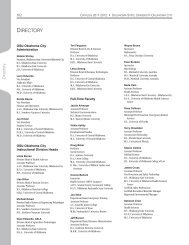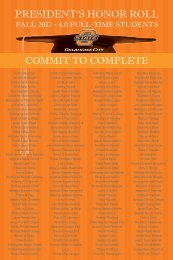Gender Discrimination/Sexual Harassment Policy & Title IX ...
Gender Discrimination/Sexual Harassment Policy & Title IX ...
Gender Discrimination/Sexual Harassment Policy & Title IX ...
Create successful ePaper yourself
Turn your PDF publications into a flip-book with our unique Google optimized e-Paper software.
Oklahoma State University <strong>Policy</strong> and ProceduresGENDER DISCRIMINATION/SEXUAL HARASSMENT POLICY &TITLE <strong>IX</strong> GRIEVANCE PROCEDURE1-0702GENERALUNIVERSITYOklahoma CityCampusApril 20051.01 GENERAL STATEMENT OF POLICYIt is the policy of Oklahoma State University (OSU) that unlawful gender discrimination in any form, includingsexual harassment of faculty and staff, or other forms of gender discrimination as referenced by <strong>Title</strong> VII of theCivil Rights Act of 1964, 42 U.S.C. §2000e (<strong>Title</strong> VII), and <strong>Title</strong> <strong>IX</strong> of the Education Amendments of 1972, 20U.S.C. §1681 (<strong>Title</strong> <strong>IX</strong>), is prohibited in the workplace and in the recruitment, appointment, and advancement ofemployees. <strong>Gender</strong> discrimination of students, including sexual harassment, as referenced by <strong>Title</strong> <strong>IX</strong>, is prohibitedin and out of the classroom and in the evaluation of students' academic or work performance. This policy is inkeeping with the spirit and intent of various federal guidelines which address the issue of fair employmentpractices, ethical standards and enforcement procedures.The University encourages victims to report instances of gender discrimination prohibited by <strong>Title</strong> <strong>IX</strong> or <strong>Title</strong> VII,including but not limited to, sexual assault or other sex offenses, either forcible or nonforcible in nature. In additionto internal grievance procedures, victims of criminal gender discrimination (e.g., sexual assault or harassment) areencouraged to file complaints or reports with the Office of Safety and Security or local law enforcement agencies assoon as possible after the offense occurs in order to preserve evidence necessary to the proof of criminal offenses.The Office of Safety and Security is available to assist victims in filing reports with other law enforcementagencies.All students, members of the faculty, and non-faculty staff personnel are required to comply with the policy andprocedures outlined to address complaints about gender discrimination, sexual harassment and sexual assault. Inaddition to the procedures outlined in this policy statement, discrimination and harassment complaints may be filedwith the U.S. Equal Employment Opportunity Commission (involving employment) or U.S. Department ofEducation, Office for Civil Rights (involving education programs or activities). Any complaint of genderdiscrimination or sexual harassment filed under the University's policy shall be processed even if the complainantalso files a complaint or suit with an outside agency, U.S. Equal Employment Opportunity Commission, or U.S.Department of Education, Office for Civil Rights. Retaliation against anyone who makes a complaint or participatesin the complaint process will not be tolerated.The University is committed to providing an environment of study and work free from gender discrimination andsexual harassment as prohibited by <strong>Title</strong> VII and <strong>Title</strong> <strong>IX</strong>, and to insuring the accessibility of appropriate grievanceprocedures for addressing all complaints regarding gender discrimination and sexual harassment, including sexualassault. The University reserves the authority to independently deal with gender discrimination, sexual harassment,and sexual assault issues whenever becoming aware of their existence, regardless of whether informal or formalcomplaints have been lodged by persons complaining of such issues.Members of the University community holding positions of authority involving the legitimate exercise of powerover others have a particular responsibility to be sensitive to that power relationship. Supervisors, in theirrelationships with subordinates, and faculty, in their relationships with students, need to be aware of potentialconflicts of interest and the possible compromise of their evaluative capacity. Because there isan inherent power difference in these relationships, the potential exists for the less powerful persons to1-0702.1
perceive a coercive element in suggestions regarding activities outside those appropriate to the professionalrelationship. It is the responsibility of faculty and staff to behave in such a manner that their words or actions arenot sexually coercive, abusive, or exploitative.<strong>Sexual</strong> harassment also can involve relationships among equals such as when repeated advances, demeaning verbalbehavior, or offensive physical contact interfere with an individual's ability to work and study productively. Thecreation or condonation of hostile working or educational environments will not be tolerated and students andemployees at all levels are subject to potential disciplinary action if engaged in such actions.The University will (1) respond to every complaint of gender discrimination, sexual harassment, or sexual assaultreported, (2) take action to provide remedies when gender discrimination, sexual harassment, or sexual assault isdiscovered, (3) impose appropriate sanctions on offenders in a case-by-case manner, and (4) protect the privacy ofall those involved to the extent it is possible. The above actions will apply to the extent permitted by law or wherepersonal safety is not an issue.1.02 INFORMATION AND ASSISTANCEAny individual who believes he/she may have experienced gender discrimination, including sexual harassment, orwho believes that he/she has observed such actions taking place, may receive information and assistance regardingthe University's policies and responsive processes from any of the following offices:1. Director of Human Resources (Affirmative Action)/<strong>Title</strong> <strong>IX</strong> CoordinatorAdministration Building, Second Floor, Human Resource Office (405)945-32972. Vice President for Finance and OperationsAdministration Building, Second Floor, Room 201B (405)945-86313. Vice President for Student Services/Student Conduct OfficerStudent Center Building, First Floor (405)945-32044. Vice President for Academic AffairsAdministration Building, Second Floor, Room 200 (405)945-3376If an apparent conflict of interest prevents use of the assistance of the above offices, the person complaining ofgender discrimination, sexual harassment, or sexual assault may request assistance directly from the Office of thePresident, Administration Building, Second Floor, (405)945-3230).1.03 GENDER DISCRIMINATION AND SEXUAL HARASSMENT DEFINITIONS"<strong>Gender</strong> discrimination" is unequal or disadvantageous treatment of an individual or group of individuals based ongender. <strong>Sexual</strong> harassment is a form of illegal gender discrimination. "<strong>Sexual</strong> harassment," as prohibited underfederal and state law and University policy, is defined as unwelcome conduct of a sexual nature, and may includeunwelcomed sexual advances, sexual assaults, or requests for sexual favors. This and other verbal or physicalconduct of a sexual nature constitutes sexual harassment when:A. submission to such conduct is made either explicitly or implicitly a term or condition of an individual'semployment or academic standing;1-0702.2
B. submission to or rejection of such conduct by an individual is used as the basis for employmentdecisions or academic decisions affecting such individual; orC. such conduct is sufficiently serious that it has the purpose or effect of unreasonably interfering with anindividual's work or academic performance or creating an intimidating, hostile, or offensive working or academicenvironment. <strong>Harassment</strong> does not include verbal expressions or written material that is relevant and appropriatelyrelated to course subject matter or curriculum, and this policy shall not abridge academic freedom or theUniversity's educational mission.1.04 EXAMPLES OF SEXUAL HARASSMENTIt is not possible to exhaustively list all examples of conduct which can constitute gender discrimination or sexualharassment. The following list of examples of conduct prohibited by this policy statement is intended to aid in theunderstanding of this area. Conduct prohibited by this policy statement may include, but is not limited to:A. VERBAL CONDUCTUnwelcome sexual flirtation, advances or propositions for sexual activity. Asking about someone else'spersonal social or sexual life or about their sexual fantasies, preferences, or history may constitute sexualharassment. Discussing your own personal sexual fantasies, preferences, or history or repeatedly asking for a datefrom a person who is not interested may also constitute sexual harassment.Continued or repeated verbal abuse of a sexual nature. Suggestive comments and sexually explicit jokes, orturning discussions at work or in the academic classroom to sexual topics may constitute sexual harassment.Making offensive sounds such as smacking or licking lips, making kissing sounds, or "wolf whistles" mayconstitute sexual harassment.<strong>Sexual</strong>ly offensive or degrading language used to describe an individual or remarks of a sexual nature todescribe a person's body or clothing. Calling a person a "hunk," "doll," "babe," "sugar," or "honey," or similardescriptive terms may constitute sexual harassment if the person being so described is offended by such terms or ifothers hearing the references are offended.Stating, indicating, or implying in any manner that benefits will be gained or lost based on response tosexual advances.B. NON-VERBALDisplaying sexually demeaning or offensive objects and pictures. Nude or semi-nude photographs anddrawings, or computer software is very likely to be viewed as sexual harassment.Staring repeatedly at someone, blocking another person's path or otherwise restricting their movements.Such acts, particularly when in conjunction with other acts or comments, may be viewed as sexual harassment.Invading a person's personal body space, such as by standing closer than appropriate or necessary for the workbeing done may similarly constitute sexual harassment.Bringing physical items to work which express sexually offensive comments regarding men or women.Messages of this nature such as might be contained on coffee mugs, hats, or tee shirts may be offensive and beviewed as sexual harassment.Making sexual gestures with hands or body movements. Looking a person up and down in a suggestive orintimidating manner may also constitute sexual harassment.1-0702.3
Letters, gifts, or materials of a sexual nature. Such attention may not be appreciated in the manner intended,may be offensive to the subject of the attention, and may constitute sexual harassment.Treating a student differently based upon his/her gender in academia or extracurricular activities, academicprograms, discipline, classroom assignment, physical education, grading, and/or athletics.C. PHYSICALOffensive physical contact. Possible problem areas include: Massaging a person's neck or shoulders;touching a person's clothing, hair, or body; hugging, kissing, patting, or stroking a person's body; touching orrubbing oneself in a sexual manner around or in the view of another person; brushing up against another person;tearing, pulling, or yanking a person's clothing, may all constitute sexual harassment.<strong>Sexual</strong> assault, coerced sexual intercourse or other sexual contact.1.05 SUPERVISORY RESPONSIBILITYProhibited gender discrimination, including sexual harassment, may result not only from situations betweensupervisors and subordinate employees, or between faculty and students, but also between employees who have nodirect or indirect supervisory relationship with one another, as well as between students.University officials in supervisory relationships with employees or students are charged with the responsibility ofresponding immediately and appropriately to correct any situations which create a hostile working or educationalenvironment within an administrative unit under their supervision. Such officials include, but are not necessarilylimited to: unit heads, academic administrators, faculty members engaged in teaching or in supervising studentworkers, and intercollegiate athletic administrators and coaching staff members. Every University faculty memberor administrator is responsible for promptly reporting, in writing, incidents of gender discrimination and sexualharassment (including sexual assault) that come to their attention or which they observe, to the <strong>Title</strong> <strong>IX</strong>Coordinator.Such officials who are concerned about whether such a situation is developing, or who desire assistance inappropriately responding to such a situation may also seek assistance from the <strong>Title</strong> <strong>IX</strong> Coordinator. Any suchofficial who fails to appropriately respond to a hostile working or educational environment, to seek assistance whena hostile working or educational environment situation develops which reasonably should have been perceived bythe official, or to promptly report such matters to the <strong>Title</strong> <strong>IX</strong> Coordinator, may be subject to disciplinary action.1.06 RETALIATIONThe University will not tolerate retaliation against persons who brings a complaint of unlawful genderdiscrimination, sexual harassment or sexual assault, whether such complaint is brought internally or with anexternal agency. A student, faculty, or staff member who retaliates in any way against an individual who hasbrought a complaint pursuant to this policy or participated in an investigation of such a complaint is subject todisciplinary action, up to and including dismissal from the University.2.01 GRIEVANCE PROCEDURESAll persons who believe that they have been subjected to prohibited gender discrimination or sexual harassment areencouraged to seek assistance from any of the offices listed above (§1.02), to directly report such conduct toappropriate supervisory officials, or to directly report such conduct to the <strong>Title</strong> <strong>IX</strong>1-0702.4
Coordinator. In instances involving allegations of gender discrimination or sexual harassment engaged in bystudents, the <strong>Title</strong> <strong>IX</strong> Coordinator will refer such matters to the Student Conduct Officer for review and otherprocessing. The Student Conduct Officer shall report the results of all such referrals to the <strong>Title</strong> <strong>IX</strong> Coordinator.As referenced above in Section 1.05, such appropriate supervisory officials include, but are not necessarily limitedto: unit heads, academic administrators, faculty members engaged in teaching or in supervising student workers,and intercollegiate athletic administrators and coaching staff members.Persons who believe that they have been subjected to prohibited gender discrimination or sexual harassment mayseek either informal or formal University evaluation and response to their concerns. However, in order fordisciplinary action to be taken against a University employee or against a student, it may be necessary for a formalcomplaint to be filed, and that procedure may require the person complaining about such behavior to cooperate withUniversity officials on a formal basis. Independent of a formal complaint, the University is nevertheless responsibleunder <strong>Title</strong> <strong>IX</strong> to investigate known concerns of gender discrimination or harassment and take steps to prevent itrecurrence and correct any discriminatory effects arising therefrom.In addition to this <strong>Policy</strong>, Oklahoma State University has in place the following general policies and procedures fordealing with concerns of unfair and/or illegal treatment:"<strong>Policy</strong> Statement to Govern Appointments, Tenure, Promotions, and Related Matters of the Faculty ofOklahoma State University-Oklahoma CityOSU P&P Letter No. 2-0901, "Informal Ombudsman Review of Qualified Faculty Employment Issues, andInformal Voluntary Mediation of Qualified Faculty Employment Issues"OSU P&P Letter No. 3-0710, "Resignations and Dismissals for Classified Staff'OSU P&P Letter No. 3-0726, "Employment, Resignation, Suspensions, and Dismissals for" Administrativeand Professional StaffOSU P&P Letter No. 3-0747, "Informal Ombudsperson Review and Informal Voluntary Mediation ofQualified Staff Employment Issues"OSU P&P Letter No. 3-0746, "Grievances and Appeals for A/P and Classified Staff”"Student Rights and Responsibilities Governing Student Behavior” (available at www.osuokc.edu/rights orin the Office of the Vice President for Student Services and the Office for Student Activities/Campus Life)OSU P&P Letter No. 2-0823, "Student <strong>Discrimination</strong> Grievances" (non-gender discrimination complaints)Students who are determined to have violated the University's policies prohibiting unlawful gender discrimination,including but not limited to sexual harassment or sexual assault, may be subject to the following disciplinaryactions, Disciplinary Sanctions of the University's policy "Student Rights and Responsibilities Governing StudentBehavior": Oral or Written Reprimand; Restriction on Privileges; Voluntary Project Assignment, CommunityService or <strong>Gender</strong> <strong>Discrimination</strong> Education; Restitution for Loss, Damage, or Injury; Enrollment Hold;Cancellation of Enrollment; Graduation Hold; Conduct Probation; Disciplinary Suspension; or DisciplinaryExpulsion.Non-faculty employees who are determined to have violated the University's policies prohibiting unlawful genderdiscrimination, including but not limited to sexual harassment or sexual assault, may be subject to disciplinaryactions under OSU P&P Letter Nos. 3-0710 or 3-0726, as applicable, including but not limited to: Oral or WrittenReprimand; Restriction on Privileges; Voluntary Project Assignment, Community Service or <strong>Gender</strong><strong>Discrimination</strong> Education; Restitution for Loss, Damage, or Injury; Placement on Structured Plan of Improvement;Loss of Pay or Rank; Suspension With or Without Pay; or Dismissal.Faculty employees who are determined to have violated the University's policies prohibiting unlawful genderdiscrimination, including but not limited to sexual harassment or sexual assault, may be subject to disciplinary1-0702.5
actions under the January 21, 2000 "<strong>Policy</strong> Statement to Govern Appointments, Tenure, Promotions, and RelatedMatters of the Faculty of Oklahoma State University-Oklahoma City." Such actions, under Sections 1.12 andAppendix C of the <strong>Policy</strong> Statement, can include: Simple Admonitions; Formal Sanctions (which can include, butare not limited to, written reprimands, required participation in counseling and/or corrective programs, restrictionson use of University privileges, resources, and services); or Dismissal.2.02 Resolution OptionsA person who believes that he or she has been subjected to gender discrimination or sexual harassment and seeks totake action may use the informal resolution and/or disciplinary processes listed above, or the review processes setforth in this policy, to seek review and redress of the matter. The informal resolution and formal complaintresolution processes described in this and other related University policies are not mutually exclusive. However,informal review and formal complaint review processes cannot be used at the same time, and, to conserveUniversity resources and to prevent redundancy, the University may consolidate requests for informal reviewand/or formal complaints. No disciplinary investigation procedures that may be pursued as the result of genderdiscrimination and/or sexual harassment, will be applied to, or take the place of, investigations (informal review orformal complaint) of complaints of discrimination based on gender, including sexual harassment, that are processedpursuant to this gender discrimination grievance procedure.In any formal resolution proceeding, the complainant possesses the right to present information relevant to his orher complaint to the appropriate investigating official. In addition, the complainant(s) and individual(s) accused areafforded the right to be advised by an individual of her or her choice throughout the formal resolution proceeding.2.03 Informal Resolution ProceduresA. Informal resolution may be an appropriate choice when the alleged conduct involved is not of a seriousor repetitive nature and disciplinary action is not required to remedy the situation. Many times, issues of concernare due to lack of communication or awareness that certain conduct is offensive and simply talking with the personengaging in the conduct in question can resolve the matter. Persons complaining of gender discrimination or sexualharassment may therefore desire to attempt to resolve the problem informally by discussing the matter with theperson who is allegedly engaging in prohibited conduct. No formal investigation is involved in the informalresolution process.B. Such informal resolution requests should be made as soon as possible, but in all cases within 90 days ofthe date of the alleged incident. Seeking informal resolution of a matter will not toll the 90-day time period forfiling a formal complaint, as set forth below.C. If informal discussion with a supervisory official is desired, the concerns ordinarily should first bedirected to the immediate supervisor of the employee, or the Student Conduct Officer for a student, accused ofengaging in gender discrimination or sexual harassment. However, if the person complaining of genderdiscrimination or sexual harassment is uncomfortable discussing the matter with such immediate supervisor orStudent Conduct Officer, if the person accused of engaging in prohibited conduct is the supervisor of the personlodging concerns or is the Student Conduct Officer, or if the supervisor or Student Conduct Officer has previouslybeen made aware of the conduct at issue and is not believed to have adequately responded to the matter, the personcomplaining of gender discrimination or sexual harassment may discuss the matter with the next highest level ofsupervisor. In all cases, such concerns may also be discussed at any time with the Director of AffirmativeAction/<strong>Title</strong> <strong>IX</strong> Coordinator.Methods for informal resolution may include, but are not limited to: coaching the person on how to directly addressa situation which is causing a problem; mediating the dispute with the parties; aiding in the modification of a1-0702.6
situation in which the offensive conduct occurred; arranging a documented meeting with the alleged offender thatinvolves a discussion of the requirements of the University's policies on gender discrimination and sexualharassment; or providing education with reference to the issues of gender discrimination, sexual harassment orsexual assault.D. Reporting and Documentation RequirementsSupervisory officials at all levels who engage in informal resolution of complaints of alleged genderdiscrimination, including sexual harassment, are required to promptly report such allegations, and the responsivemeasures taken, in writing, to the University's <strong>Title</strong> <strong>IX</strong> Coordinator. Such reports shall be made within two (2)working days of resolution of the complaint. Such officials include, but are not necessarily limited to: unit heads,academic administrators and faculty members engaged in teaching or in supervising student workers. The StudentConduct Officer shall also make such reports to the <strong>Title</strong> <strong>IX</strong> Coordinator.The University shall document all informal resolutions. Such documentation shall be retained by the <strong>Title</strong><strong>IX</strong> Coordinator for at least three (3) years from the date of conclusion of the informal resolution procedure and willbe kept confidential to the extent permitted by law. Informal resolution attempts shall not be considered aprecondition for the filing of a written grievance.2.04 Complaints Against Students -Formal Resolution ProceduresA. An investigation by the Student Conduct Officer responding to allegations of gender discrimination orsexual harassment and leading to possible disciplinary action against a student will be initiated if a timely andcomplete grievance is filed with the StudentConduct Officer. Such an investigation shall follow the procedures set forth in OSU-OKC Sections III through VIIIof the OSU Student Rights and Responsibilities policy, except as such policies are specifically augmented in this<strong>Policy</strong>. Such a grievance must be filed, in writing, with the Student Conduct Officer within 90 calendar days of theoccurrence of the alleged violation. In extraordinary circumstances, the time frame for such filing may be extendedby the Student Conduct Officer to an additional 90-day time period.B. Upon receipt of such a complaint, the Student Conduct Officer shall (1) notify the complainant withintwo working days, in writing, of receipt of the complaint and of the actions the Officer will take with the complaint,and (2) engage in a preliminary review of the matter to determine whether disciplinary procedures should beinitiated in response to the complaint as called for in the Student Rights and Responsibilities policy. Such review, atthe minimum, will normally involve meeting personally with the individual(s) filing the complaint, with theindividual(s) accused of violations of University policy, and any relevant witnesses to the alleged actions at issue,together with reviewing any documentary evidence relevant to the matter. Such a determination shall ordinarily bemade within ten (10) working days of the receipt by the Student Conduct Officer of the complaint. In extraordinarycircumstances, the Student Conduct Officer has the authority to extend this 10-day time period. In such instances,the Student Conduct Officer shall notify the complainant and the respondent of such, and the date when thepreliminary determination will be made.C. If it is determined by the Student Conduct Officer that the University will not proceed with adisciplinary proceeding, the Student Conduct Officer will send a notification letter explaining the reason(s) to thecomplainant, with a copy to the alleged offender. The notification letter will also include a statement informing thecomplainant that, within ten (10) working days of the notification, he or she may appeal the determination not toproceed to the Vice President for Student Services. The request for appeal must be a signed, written documentarticulating why the decision to dismiss the complaint is believed to be in error.1-0702.7
The Vice President for Student Services shall respond within ten (10) working days of receipt of the appeal. If thedecision to dismiss is upheld, that decision is final. If the decision is overturned, the complaint is sent back to theStudent Conduct Officer for investigation in accordance with the procedures outlined below.D. If it is determined that the University will proceed with a formal disciplinary proceeding, the StudentConduct Officer will give the complainant and the respondent notification of such determination as called for in theStudent Rights and Responsibilities policy. If a student conduct committee is to be convened to consider the matterunder review, such hearing shall be scheduled to take place within fifteen (15) working days of such notification. Inextraordinary circumstances, the Student Conduct Officer has the authority to extend this 15-day time period. Insuch instances, the Student Conduct Officer shall notify the complainant and the respondent of such, and the datewhen the hearing will be held. The hearing shall follow the procedures set forth in the Student Rights andResponsibilities policy and the complainant and respondent shall have equal rights in all phases of the hearing andappeal processes set forth in the Student Rights and Responsibilities policy.2.05 Complaints against Non-Faculty Employees -Formal Resolution ProceduresA. Complaints and grievances alleging gender discrimination or sexual harassment against non-faculty staffpersonnel may be initiated either through the University's general employee grievance/disciplinary policies locatedin P&P Letter No. 3-0710,"Resignations and Dismissals for Classified Staff," or P&P Letter No. 3-0726,"Employment, Resignation, Suspensions, and Dismissals for Administrative and Professional Staff," in accordancewith the status of the employee, or through the <strong>Title</strong> <strong>IX</strong> Coordinator. Such complaints filed with the <strong>Title</strong> <strong>IX</strong>Coordinator shall be transferred by the <strong>Title</strong> <strong>IX</strong> Coordinator to the appropriate unit administrator for further reviewand action within two (2) working days of receipt of the complaint.An investigation in response to a complaint against a non-faculty staff employee shall follow theprocedures set forth in the OSU policies governing non-faculty grievances or disciplinary actions located in P&PLetter No. 3-0710, "Resignations and Dismissals for Classified Staff," or P&P Letter No. 3-0726, "Employment,Resignation, Suspensions, and Dismissals for Administrative and Professional Staff," in accordance with the statusof the employee, except as such policies are specifically augmented in this <strong>Policy</strong>.B. A complaint alleging gender discrimination or sexual harassment allegedly committed by a non-facultystaff employee may be filed, in writing, with either the appropriate unit administrator or with the <strong>Title</strong> <strong>IX</strong>Coordinator within 90 calendar days of the occurrence of the alleged violation. In extraordinary circumstances, thetime frame for such filing may be extended by the unit administrator or the <strong>Title</strong> <strong>IX</strong> Coordinator to an additional90-day time period.C. Unit administrators who receive complaints alleging gender discrimination or sexual harassmentallegedly committed by non-faculty staff employees shall notify the Director of Human Resources/<strong>Title</strong> <strong>IX</strong>Coordinator of their receipt of such a complaint within two (2) working days of receiving the complaint.D. Upon receipt of a grievance or complaint against a non-faculty staff employee, the Director of HumanResources/<strong>Title</strong> <strong>IX</strong> Coordinator, or the unit administrator, as appropriate, shall (1) notify the complainant withintwo working days, in writing, of receipt of the complaint and of the actions that will be taken with the complaint,and (2) engage in a preliminary review of the matter to determine whether formal grievance or disciplinaryprocedures should be initiated in response to the complaint. Such a determination shall ordinarily be made withinten (10) working days of the receipt by the unit administrator or Department of Human Resources of the complaint.In extraordinary circumstances, the Director of Human Resources or appropriate unit administrator has theauthority to extend this 10-day time period. In such instances, the complainant and the respondent shall be notifiedof such, and the date when the preliminary determination will be made.1-0702.8
E. Where formal grievance proceedings are requested due to allegations of gender discrimination or sexualharassment by non-faculty employees, if it is determined by the Director of Human Resources that the Universitywill not proceed with a formal grievance proceeding, the Director of Human Resources will send a notificationletter explaining the reason(s) to the complainant, with a copy to the alleged offender. The notification letter willalso include a statement informing the complainant that, within ten (10) working days of the notification, he or shemay appeal the determination not to proceed to the Vice President for Finance and Operations. The request forappeal must be a signed, written document articulating why the decision to dismiss the complaint is believed to bein error.The Vice President for Finance and Operations shall respond within ten (10) working days of receipt of theappeal. If the decision to dismiss is upheld, that decision is final. If the decision is overturned, the complaint is sentback to the Director of Human Resources for action in accordance with the procedures outlined in P&P Letter No.3-0746, "Grievances and Appeals for Administrative/Professional and Classified Staff".F. Where formal disciplinary action is requested due to allegations of gender discrimination or sexualharassment by non-faculty employees, if it is determined by the unit administrator that the University will notproceed with a formal disciplinary action, the unit administrator will send a notification letter explaining thereason(s) to the complainant, with a copy to the alleged offender.The notification letter will also include a statement informing the complainant that, within ten (10) workingdays of the notification, he or she may appeal the determination not to take disciplinary action to the Vice Presidentcharged with supervision over the unit. The request for appeal must be a signed, written document articulating whythe decision to dismiss the complaint is believed to be in error.The Vice President shall respond within ten (10) working days of receipt of the appeal. If the decision todismiss is upheld, that decision is final. If the decision is overturned, the complaint is sent back to the unitadministrator for action in accordance with the procedures outlined in P&P Letter No. 3-0710,"Resignations andDismissals for Classified Staff," or P&P Letter No. 3-0726, "Employment, Resignation, Suspensions, andDismissals for Administrative and Professional Staff," in accordance with the status of the employee.G. If it is determined that disciplinary action will be taken in response to the complaint, the unitadministrator will proceed with such action, following P&P Letter No. 3-0710, "Resignations and Dismissals forClassified Staff," or P&P Letter No. 3-0726, "Employment, Resignation, Suspensions, and Dismissals forAdministrative and Professional Staff," in accordance with the status of the employee, relating to imposingdisciplinary action against non-faculty employees. The unit administrator shall give the complainant and therespondent notification of such determination. Such action and notification shall normally be concluded withinfifteen (15) working days of the receipt by the unit administrator of the complaint. In extraordinary circumstances,the unit administrator has the authority to extend this 15-day time period. In such instances, the unit administratorshall notify the complainant and the respondent of such, and the date when the disciplinary process will beconcluded.2.06 Complaints against Faculty Employees -Formal Resolution ProceduresA. The University's policies for formal complaints against members of the faculty are set forth in the"<strong>Policy</strong> Statement to Govern Appointments, Tenure, Promotions, and Related Matters of the Faculty of OklahomaState University" (January 21, 2000) ("the <strong>Policy</strong> Statement"). A grievance of gender discrimination or sexualharassment allegedly committed by members of the faculty may be initially filed with the <strong>Title</strong> <strong>IX</strong> Coordinator orthe appropriate academic unit administrator. If such complaints are filed with the <strong>Title</strong> <strong>IX</strong> Coordinator, suchcomplaints shall be transferred for review and action by the <strong>Title</strong> <strong>IX</strong> Coordinator to the appropriate academic unitadministrator within two (2) working days of receipt of such complaint, with a copy transmitted to the VicePresident for Academic Affairs. Within two (2) working days of the academic unit administrator's receipt of thecomplaint, the administrator shall notify the complainant, in writing, of receipt of the complaint and of the actionsthe academic unit administrator will take with the complaint.1-0702.9
B. In instances not involving the possible dismissal of a faculty member due to alleged genderdiscrimination or sexual harassment, the appropriate academic unit administrator (or substitute academicadministrator appointed by the Vice President for Academic Affairs as authorized in the <strong>Policy</strong> Statement) shallreview the complaint and take responsive action as deemed appropriate normally within thirty (30) working days,following due process provisions as set forth in the <strong>Policy</strong> Statement.C. Where formal disciplinary action not involving possible dismissal is requested due to allegations ofgender discrimination or sexual harassment by a faculty member, if it is determined by the unit administrator thatthe University will not proceed with a formal disciplinary action, the unit administrator will send a notificationletter explaining the reason(s) to the complainant, with a copy to the alleged offender. The notification letter willalso include a statement informing the complainant that, within ten (10) working days of the notification, he or shemay appeal the determination not to take disciplinary action to the Division Head charged with supervision over theunit. The request for appeal must be a signed, written document articulating why the decision to dismiss thecomplaint is believed to be in error.The Division Head shall respond within ten (10) working days of receipt of the appeal. If the decision not to takedisciplinary action is upheld, that decision is final. If the decision is overturned, the complaint is sent back to theunit administrator for action in accordance with the procedures outlined in the University's disciplinary proceduresfor faculty.In instances involving the possible dismissal of a faculty member due to alleged gender discrimination or sexualharassment, the procedures set forth in the General Termination Procedures of the <strong>Policy</strong> Statement shall befollowed.2.07 Formal Resolution Reporting and Documentation RequirementsOfficials taking action via formal disciplinary or grievance proceedings (whether involving student, non-facultystaff, and members of the faculty) in response to complaints of alleged gender discrimination or sexual harassmentare required to report such actions, in writing, to the University's <strong>Title</strong> <strong>IX</strong> Coordinator. Such reports shall be madewithin two (2) working days of resolution of the complaint. Such officials include, but are not necessarily limitedto: unit heads, academic administrators, faculty members engaged in teaching or in supervising student workers,and intercollegiate athletic administrators and coaching staff members. The Student Conduct Officer shall alsomake such reports to the <strong>Title</strong> <strong>IX</strong> Coordinator.The University shall document formal resolutions. Such documentation shall be retained by the <strong>Title</strong> <strong>IX</strong>Coordinator for at least three (3) years from the date of conclusion of the formal resolution procedure and will bekept confidential to the extent permitted by law.3.01 <strong>Title</strong> <strong>IX</strong> Coordinator Review AuthorityNothing contained in this <strong>Policy</strong> shall be construed to limit or qualify the authority of the <strong>Title</strong> <strong>IX</strong> Coordinator toindependently review any allegations of gender discrimination or sexual harassment on an informal basis and tomake such reports as the <strong>Title</strong> <strong>IX</strong> Coordinator deems appropriate and necessary to University administrators.1-0702.10
Appendix AEQUAL EMPLOYMENT OPPORTUNITY COMMISSION 29 CFR Part 1604DISCRIMINATION BECAUSE OF SEX UNDER TITLE VII OF THE CIVIL. RIGHTS ACT OF 1964, ASAMENDED; ADOPTION OF FINAL INTERPRETIVE GUIDELINES AGENCY: Equal EmploymentOpportunity Commission.ACTION: Final Amendment to Guidelines on <strong>Discrimination</strong> Because of Sex.SUMMARY: On April 11, 1980, the Equal Employment Opportunity Commission published the InterimGuidelines on sexual harassment as an amendment to the Guidelines on <strong>Discrimination</strong> Because of Sex, 29 CFRpart 1604.11,45 FR 25024. This amendment will reaffirm that sexual harassment is an unlawful employmentpractice. The EEOC received public comments for 60 days subsequent to the date of publication of the InterimGuidelines. As a result of the comments and the analysis of them, these Final Guidelines were drafted.EFFECTIVE DATE: November 10, 1980.FOR FURTHER INFORMATION CONTACT: Karen Danart, Acting Director, Office of <strong>Policy</strong> Implementation,Equal Employment Opportunity Commission, 2401 E Street, NW, Washington, D.C. 20506, (202) 634-7060.(Supplementary information concerning comments received on the interim guidelines, and relevant case law isomitted.)Accordingly, 29 CFR Chapter XIV, Part 1604 is amended by adding § 1604.11 to read as follows: PART 1604-GUlDELlNES ON DISCRIMINATION BECAUSE OF SEX§ 1604.11 <strong>Sexual</strong> harassment.(a) <strong>Harassment</strong> on the basis of sex is a violation of Sec. 703 of <strong>Title</strong> VII. The principles involvedhere continue to apply to race, color, religion or other origin. Unwelcome sexual advances, requestsfor sexual favors, and other verbal or physical conduct of a sexual nature constitute sexualharassment when(1) submission to such conduct is made either explicitly or implicitly a term or condition ofan individual's employment,(2) submission to or rejection of such conduct by an individual is used as the basis foremployment decisions affecting such individual, or(3) such conduct has the purpose or effect of unreasonably interfering with an individual'swork performance or creating an intimidating, hostile, or offensive working environment.(b) In determining whether alleged conduct constitutes sexual harassment, the Commission willlook at the record as a whole and at the totality of the circumstances, such as the nature of thesexual advances and the context in which the alleged incidents occurred. The determination of thelegality of a particular action will be made from the facts, on a case by case basis.(c) Applying general <strong>Title</strong> VII principles, an employer, employment agency, joint apprenticeshipcommittee or labor organization (hereinafter collectively referred to as "employer") is responsiblefor its acts and those of its agents and supervisory employees with respect to sexual harassment1-0702.11
egardless of whether the specific acts complained of were authorized or even forbidden by theemployer and regardless of whether the employer knew or should have known of their occurrence.The Commission will examine the circumstances of the particular employment relationship and thejob functions performed by the individual in determining whether an individual acts in either asupervisory or agency capacity.(d) With respect to conduct between fellow employees, an employer is responsible for acts ofsexual harassment in the workplace where the employer (or its agents or supervisory employees)knows or should have known of the conduct, unless it can show that it took immediate andappropriate corrective action.(e) An employer may also be responsible for the acts of non-employees, with respect to sexualharassment of employees in the workplace, where the employer (or its agents or supervisoryemployees) knows or should have known of the conduct and fails to take immediate andappropriate corrective action. In reviewing these cases the Commission will consider the extent ofthe employer's control and any other legal responsibility which the employer may have with respectto the conduct of such non-employees.(f) Prevention is the best tool for the elimination of sexual harassment. An employer should take allsteps necessary to prevent sexual harassment from occurring, such as affirmatively raising thesubject, expressing strong disapproval, developing appropriate sanctions, informing employees oftheir right to raise and how to raise the issue of harassment under <strong>Title</strong> VII, and developingmethods to sensitize all concerned.(g) Other related practices: Where employment opportunities or benefits are granted because of anindividual's submission to the employer's sexual advances or requests for sexual favors, theemployer may be held liable for unlawful sex discrimination against other persons who werequalified for but denied that employment opportunity or benefit.(<strong>Title</strong> Vll, Pub. L. 88-352,78 Stat. 253 (42 V.S.C. 2000e et sez.» (FR Doc. 80-34981 Filed 11-7-80,8:45 a.m.) Billing Code 6570-06-MFederal Register Vol. 45, No. 219/Monday, November 10, 1980/Rules and Regulations 74676-746771-0702.12




